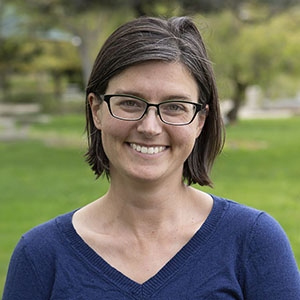Erin Nuccio

July 27, 2020
What do you like about working at the Lab?
I love the collaborative nature of LLNL. If I need expertise on a project, there is bound to be an expert here willing to work with me. In addition, we have multiple instruments that are either rare or one-of-a-kind, which allows me to gain unique insights into my study system.
What do your day-to-day work activities include?
I typically spend a few months in the lab growing plants or troubleshooting protocols, and then the rest of my time is spent using bioinformatics to analyze the data and writing manuscripts. Every year I typically get a chance to go out into the field for an experimental soil harvest.
What is one project you’re really proud to have worked on?
I recently published a paper in The ISME Journal on soil metatranscriptomics that looked at how roots alter the decomposition of decaying plant litter. RNA is notoriously unstable and hard to work with in the lab, and sequencing generates a ton of data. It is a unique dataset that I’m really proud to have produced, and I wrote many useful coding scripts along the way that I can now use for other projects.
What is your educational or career background?
I have a BS in environmental science and a BA in religious studies, both from Santa Clara University, an MESM in environmental science and management from the University of California (UC), Santa Barbara, and a PhD in microbiology from UC Berkeley. I’ve worked at the Lab for 7 years.
What inspired you to go into your field of work?
I’ve had a long-standing interest in how plant–microbial interactions can be used for the public good. As a master’s student, I took a bioremediation course that showed that toxin degradation surrounding plant roots is really the work of a community of microbes rather than a single organism. The importance of microbial community interactions stuck with me and inspired me to do a PhD in soil microbial ecology.
What advice would you give to a new employee at the Lab?
Developing relationships at the Lab is a huge part of the experience, and those relationships become your support network both scientifically and personally. Make time for lunch with colleagues and reach out to mentors, your support staff, and your managers when you have questions.
What do you do in your free time?
I love spending time in nature, such as hiking, camping, or rock climbing. I’m also a bookworm and will happily spend all my free time reading. I’m a member of the Lawrence Livermore Laboratory Women’s Association.
Learn more about Erin:
Biography




